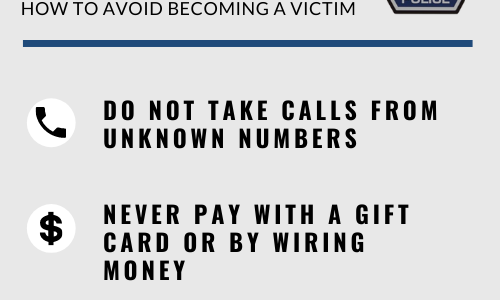ESSEX — With tax deadlines approaching, Chief Paul Francis and the Essex Police Department would like to advise the community to be careful with personal and financial information when filing taxes.
“Criminals have a variety of ways they target individuals during tax season, including through identify theft and phone scams,” Chief Francis said. “We want residents to be aware of the common ways scammers try to take advantage of people so they can protect themselves.”
One common scam involves residents trying to file their taxes electronically, only to learn they had been submitted by another entity. Residents are encouraged to complete and file taxes as soon as possible to give potential scammers less time and opportunity to submit a refund using their information.
Other scams that have been known to occur, especially during tax season, include scammers calling residents claiming to be from the IRS or another government body.
The scammer informs victims that they did not pay, or incorrectly filed their taxes and now owe money to the IRS, which must be paid promptly through a pre-loaded debit card or wire transfer. If victims refuse to cooperate, they are then threatened with arrest, deportation or suspension of a business or driver’s license. Scammers also sometimes claim to represent the victim’s local police department. Local police do not enforce federal tax laws in any capacity.
To avoid becoming a victim of an IRS scam, residents are encouraged to remember the following:
- If you owe back taxes, the IRS will contact you by mail, and not by phone, email or social media.
- The IRS never requests personal or financial information by email, text or social media. (The IRS says it has no way to text people.)
- The IRS does not leave prerecorded or urgent voicemails.
- The IRS will not ask for payment using a pre-paid debit card, gift cards, a money order or wire transfer.
- The IRS will not ask for a credit card number over the phone.
In the latest scam, an “IRS agent” states that a small fee is required to qualify for a government stimulus check. No government agency, including the IRS, requires anyone to pay anything to receive a stimulus payment.
If you receive a call from an IRS scammer, hang up. Do not engage with these callers.
If you get a call from someone claiming to be with the IRS asking for a payment, or if you think you may owe money, hang up and call the IRS directly at 800-829-1040.
If you get a scam call and do not owe taxes, fill out the “IRS Impersonation scam” form online at treasury.gov, or call the Treasury Inspector General for Tax Administration at 800-366-4484.
The IRS also advises residents to forward scam emails to phishing@irs.gov, and to not open attachments or click on links in those emails.
If you are ever unsure about a potential scam, contact the Essex Police Department at 978-768-6628.
ESSEX — With tax deadlines approaching, Chief Paul Francis and the Essex Police Department would like to advise the community to be careful with personal and financial information when filing taxes.
“Criminals have a variety of ways they target individuals during tax season, including through identify theft and phone scams,” Chief Francis said. “We want residents to be aware of the common ways scammers try to take advantage of people so they can protect themselves.”
One common scam involves residents trying to file their taxes electronically, only to learn they had been submitted by another entity. Residents are encouraged to complete and file taxes as soon as possible to give potential scammers less time and opportunity to submit a refund using their information.
Other scams that have been known to occur, especially during tax season, include scammers calling residents claiming to be from the IRS or another government body.
The scammer informs victims that they did not pay, or incorrectly filed their taxes and now owe money to the IRS, which must be paid promptly through a pre-loaded debit card or wire transfer. If victims refuse to cooperate, they are then threatened with arrest, deportation or suspension of a business or driver’s license. Scammers also sometimes claim to represent the victim’s local police department. Local police do not enforce federal tax laws in any capacity.
To avoid becoming a victim of an IRS scam, residents are encouraged to remember the following:
- If you owe back taxes, the IRS will contact you by mail, and not by phone, email or social media.
- The IRS never requests personal or financial information by email, text or social media. (The IRS says it has no way to text people.)
- The IRS does not leave prerecorded or urgent voicemails.
- The IRS will not ask for payment using a pre-paid debit card, gift cards, a money order or wire transfer.
- The IRS will not ask for a credit card number over the phone.
In the latest scam, an “IRS agent” states that a small fee is required to qualify for a government stimulus check. No government agency, including the IRS, requires anyone to pay anything to receive a stimulus payment.
If you receive a call from an IRS scammer, hang up. Do not engage with these callers.
If you get a call from someone claiming to be with the IRS asking for a payment, or if you think you may owe money, hang up and call the IRS directly at 800-829-1040.
If you get a scam call and do not owe taxes, fill out the “IRS Impersonation scam” form online at treasury.gov, or call the Treasury Inspector General for Tax Administration at 800-366-4484.
The IRS also advises residents to forward scam emails to phishing@irs.gov, and to not open attachments or click on links in those emails.
If you are ever unsure about a potential scam, contact the Essex Police Department at 978-768-6628.

ESSEX — With tax deadlines approaching, Chief Paul Francis and the Essex Police Department would like to advise the community to be careful with personal and financial information when filing taxes.
“Criminals have a variety of ways they target individuals during tax season, including through identify theft and phone scams,” Chief Francis said. “We want residents to be aware of the common ways scammers try to take advantage of people so they can protect themselves.”
One common scam involves residents trying to file their taxes electronically, only to learn they had been submitted by another entity. Residents are encouraged to complete and file taxes as soon as possible to give potential scammers less time and opportunity to submit a refund using their information.
Other scams that have been known to occur, especially during tax season, include scammers calling residents claiming to be from the IRS or another government body.
The scammer informs victims that they did not pay, or incorrectly filed their taxes and now owe money to the IRS, which must be paid promptly through a pre-loaded debit card or wire transfer. If victims refuse to cooperate, they are then threatened with arrest, deportation or suspension of a business or driver’s license. Scammers also sometimes claim to represent the victim’s local police department. Local police do not enforce federal tax laws in any capacity.
To avoid becoming a victim of an IRS scam, residents are encouraged to remember the following:
- If you owe back taxes, the IRS will contact you by mail, and not by phone, email or social media.
- The IRS never requests personal or financial information by email, text or social media. (The IRS says it has no way to text people.)
- The IRS does not leave prerecorded or urgent voicemails.
- The IRS will not ask for payment using a pre-paid debit card, gift cards, a money order or wire transfer.
- The IRS will not ask for a credit card number over the phone.
In the latest scam, an “IRS agent” states that a small fee is required to qualify for a government stimulus check. No government agency, including the IRS, requires anyone to pay anything to receive a stimulus payment.
If you receive a call from an IRS scammer, hang up. Do not engage with these callers.
If you get a call from someone claiming to be with the IRS asking for a payment, or if you think you may owe money, hang up and call the IRS directly at 800-829-1040.
If you get a scam call and do not owe taxes, fill out the “IRS Impersonation scam” form online at treasury.gov, or call the Treasury Inspector General for Tax Administration at 800-366-4484.
The IRS also advises residents to forward scam emails to phishing@irs.gov, and to not open attachments or click on links in those emails.
If you are ever unsure about a potential scam, contact the Essex Police Department at 978-768-6628.






